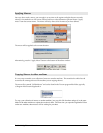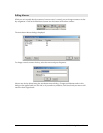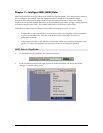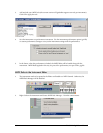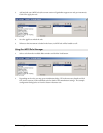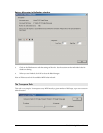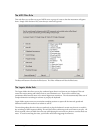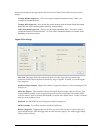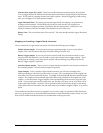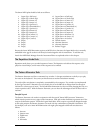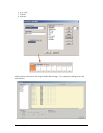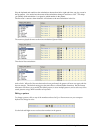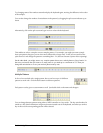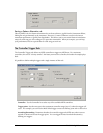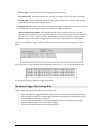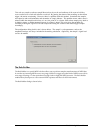
TASCAM GigaEditor 4 Manual 187
Alternate Non-Legato Key 1 and 2. ese keys provide alternate sustaining samples when pressed.
You can toggle between the Default and Alternate Sustain articulations by pressing these keys between
notes. is is good for repeating the same note within a phrase. Instead of triggering a fresh starting
note, you can trigger one of these alternate samples.
Legato reshold Time. is setting can help the Legato Mode rule adapt to your performance
technique on the keyboard. e threshold sets the time in which the tool will recognize two
consecutive notes as a legato transition. Experiment with this setting until it works best for you.
Ideally, the Release Time and reshold Time should be set to the same value.
Release Time. is sets the delay time of the note-o. is value should match the Legato reshold
setting.
Mapping and creating a Legato Mode instrument
e raw material for a Legato Mode instrument will include the following sets of samples:
Default Sustain samples. You need some basic long sustaining samples to serve as your default
samples. is is the articulation that plays rst before sliding to another note.
Release Trigger samples. If you want to have the natural sound of the instrument release or some
natural room or hall ambience, you will need to create some standard release trigger samples. is is
usually done by creating a copy of the sustain samples and then deleting everything except the tail.
Release Trigger samples are optional.
Alternate Sustain samples. ere is room in a Legato Mode instrument for two alternate variations of
the sustaining samples. Alternate Sustain amples are optional.
Legato Samples. To do a complete Legato Mode instrument, you will need recordings of the
instrument sliding to and from every interval for every note. e recording starts on the original note,
then slides to the interval and holds the note. e length of this hold should match the Default Sustain
samples. e samples are then trimmed right at the slide leaving a little bit of the original note in the
samples. As with the Release Trigger samples, a little experimenting will be necessary to get the right
sound. To save sample space and recording time, you can skip every other note or every third note as
is done with other samples. You don’t want to go further than every third note though, or the timing
of the slides will be too noticeable. e end result needs to be 24 folders of legato samples, 12 up and 12
down.
e articulations listed above need to be mapped in a strict order, using a 32-split Smart MIDI dimension.
One way to go about this is to create individual instruments for each articulation (sustain, release, etc.) and
then use the Combine Instruments function to assemble them in the proper order.



